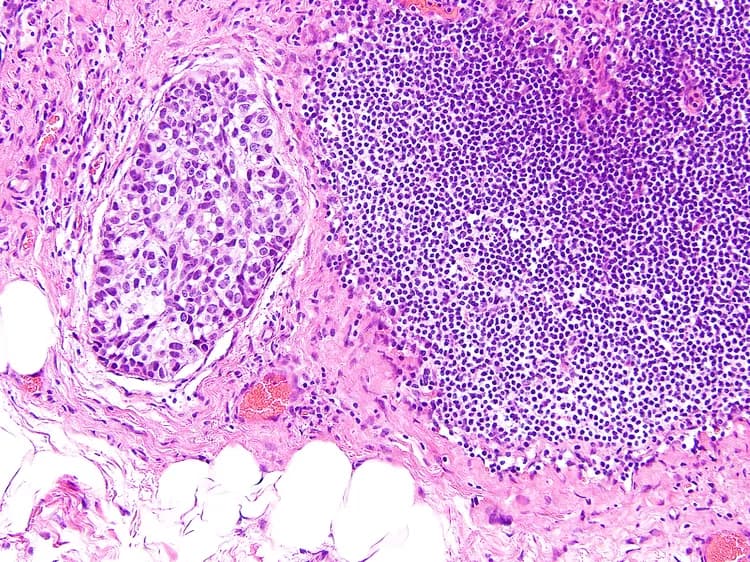
Researchers Unlock Mechanism Of Drug Resistance In Aggressive Breast Cancer
Breast cancer cells are evasive, finding ways to bypass drugs designed to stop their unchecked growth. In a new study, researchers uncovered a mechanism of resistance used by a particularly aggressive breast cancer type, and revealed a possible drug combination that could stop cancer growth and also help to prevent resistance.
In the journal Cancer Discovery, UNC Lineberger Comprehensive Cancer Center researchers and colleagues report findings of just how triple negative breast cancer cells are able to bypass treatment with trametinib, a U.S. Food and Drug Administration-approved drug that belongs to a class of commonly used anti-cancer drugs called kinase inhibitors. The researchers also reported findings from laboratory models of breast cancer testing a potential treatment approach that could prevent the onset of resistance.
"Tumor cells are extremely adaptive and responsive. When you treat patients with kinase inhibitors there is often a strong initial arrest of tumor growth, but, invariably, resistance develops," said Gary L. Johnson, PhD, a UNC Lineberger member and Kenan Distinguished Professor in the UNC School of Medicine Department of Pharmacology. "What we found is that tumor resistance to this type of drug involves what we call 'adaptive reprogramming' of the genome. But we learned how to arrest the adaptive reprogramming and make the tumor remain vulnerable to the drug. Thus, we blocked the onset of resistance."
Johnson and his colleagues used advanced genetic sequencing technologies to uncover how triple negative cancer cells developed resistance to the kinase inhibitor trametinib. Targeted therapies, like trametinib, are designed to block specific signaling pathways that are overactive or abnormal in cancer. However, cancer cells can change the expression of genes in alternative protein pathways in order to skirt around the blocked pathway, allowing them to restart uncontrolled cell growth.
In particular, triple negative breast cancer cells treated with trametinib altered their genetic landscape by forming several thousand new "enhancers" -- DNA sequences that help to turn on specific genes. The enhancers are bound by molecules, such as one called BRD4, that help to turn on genes.
"In response to treatment with trametinib, we saw the cells turning on new genes to allow them to overcome the action of the kinase inhibitor," said the paper's first author Jon Zawistowski, PhD, research assistant professor in the UNC School of Medicine Department of Pharmacology. "We really saw vast remodeling of the genomic landscape in response to therapy."
To see if they could reverse the changes that were causing resistance, they tested an investigational drug that blocks BRD4's ability to induce the formation of new enhancers that drove the genetic changes involved in resistance to trametinib. They found that pairing the investigational anti-BRD4 drug with trametinib helped to stop tumor growth in experiments in cells and in mouse models.
"We were able to actually inhibit the reprogramming of the tumor cells so that they stay vulnerable to the first drug," Johnson said. "In fact, we were able to reverse the development of resistance to trametinib."
To make sure their findings about the mechanism of resistance were relevant in actual breast cancers, the researchers examined triple negative breast cancer samples from women participating in a clinical trial led by UNC Lineberger member Lisa A. Carey, MD, physician-in-chief of the N.C. Cancer Hospital and the Richardson and Marilyn Jacobs Preyer Distinguished Professor in Breast Cancer Research.
In that trial, women with newly diagnosed triple negative breast cancer allowed biopsies of their cancers before and after one week of treatment with low doses of trametinib. Johnson and his colleagues found that their prediction of resistance to these drugs from laboratory models held true in the human breast cancers, lending further support to approaches they are developing to prevent this resistance.
"Drug resistance is a major problem in triple negative breast cancer, and is the reason so many promising drugs for this challenging kind of breast cancer have failed," Carey said. "This research is shining a bright light on why this happens and how we might fight it. I am really excited about the future for these kinds of treatments." While the findings of the possible drug combination were made through preclinical studies, the researchers hope the study will advance to a clinical setting for additional investigation.
"As a clinician, I have to also say that this kind of collaboration, in which brilliant scientists partner directly with doctors and cancer patients to examine our thorniest problems is the roadmap for how we can deliver great ideas into the clinic quickly," Carey said.
Materials provided by University of North Carolina Health Care System. Note: Content may be edited for style and length.
Disclaimer: DoveMed is not responsible for the accuracy of the adapted version of news releases posted to DoveMed by contributing universities and institutions.
Primary Resource:
Zawistowski, J. S., Bevill, S. M., Goulet, D. R., Stuhlmiller, T. J., Beltran, A. S., Olivares-Quintero, J. F., ... & Chen, X. (2017). Enhancer Remodeling During Adaptive Bypass to MEK Inhibition Is Attenuated by Pharmacological Targeting of the P-TEFb Complex. Cancer Discovery, CD-16. DOI: 10.1158/2159-8290.CD-16-0653
Related Articles
Test Your Knowledge
Asked by users
Related Centers
Related Specialties
Related Physicians
Related Procedures
Related Resources
Join DoveHubs
and connect with fellow professionals

0 Comments
Please log in to post a comment.